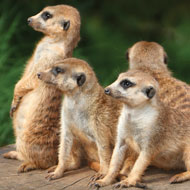The sinister side to meerkats explained

A study led by the University of Edinburgh has revealed that the alpha female meerkat can flourish when it maintains the sole right to breed.
Meerkats live in groups with a dominant breeding pair and many adult helpers. This way of life, also found in many animals such as ants and bees, can prove effective despite its sinister side.
Dominant meerkats control breeding within their group through violence. They banish any females who reproduce, and kill their grandchildren, to ensure plentiful resources for the alpha pair's pups.
Scientists studied the impact of giving contraceptive jabs to adult female helpers in 12 groups of meerkats in the Kalahari Desert, to ensure that they could not reproduce for six months.
During this time, dominant females were less aggressive towards helpers and foraged more, gaining more weigh and having bigger pups.
Dr Matt Bell from the School of Biological Sciences, said: "The meerkat way of life is a paradox, in which alpha females will attack their daughters, banish them from the group and infanticide their offspring. Our study reveals that dominant animals are worse off when subordinates in their group try to breed - explaining why they brutally suppress others much of the time."
The study, published in Nature Communications, was carried out by the Universities of Edinburgh, Cambridge, Exeter and Pretoria with the Kalahari Meerkat Project in South Africa. It was supported by the Natural Environment Research Council.



 The Animal and Plant Health Agency (APHA) has updated its online reporting service for dead wild birds.
The Animal and Plant Health Agency (APHA) has updated its online reporting service for dead wild birds.